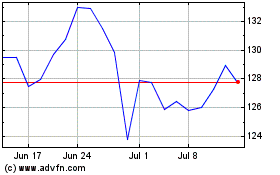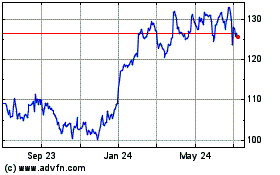Bristol Myers: Opdivo Failed to Meet Endpoint in Key Lung Cancer Study--Update
August 05 2016 - 9:39AM
Dow Jones News
By Anne Steele
Bristol-Myers Squibb Co. said a trial investigating its
blockbuster cancer drug Opdivo as a therapy for advanced non-small
cell lung cancer failed to meet its primary endpoint.
Shares in the company dropped 19% to $61 in premarket
trading.
Meanwhile, shares of Merck & Co. rose 11% as the results
suggest sales of its rival immunotherapy cancer drug Keytruda could
benefit from the trial's failure. In June, Merck's similar trial
investigating the use of Keyruda for the same condition met its
primary endpoint. The drug prolonged survival versus chemotherapy,
though Merck hasn't released full details yet.
Bristol said the trial, named CheckMate -026, didn't show
progression-free survival in patients with previously untreated
advanced non-small cell lung cancer.
"While we are disappointed CheckMate -026 didn't meet its
primary endpoint in this broad patient population, we remain
committed to improving patient outcomes through our comprehensive
development program, " said Bristol-Myers Chief Executive Dr.
Giovanni Caforio.
Bristol was the first to bring to market an immunotherapy, which
aims to fight cancer by unshackling the body's immune system. Sales
of Opdivo -- its newest immunotherapy -- rose to $840 million in
the most recent quarter, up $718 million from a year earlier and
accounting for much of Bristol's revenue gains in the quarter.
Ahead of Bristol's Friday report, Leerink analysts had said a
CheckMate -026 failure could push Merck's immuneoncology sales to
$5 billion in 2026 -- compared with a $3.5 billion base
estimate.
"We'd expect Merck to gain significant traction in the overall
market," Leerink said.
Keytruda, an infused drug, was approved in 2014 for the
treatment of melanoma. Then, it was a new type of immunotherapy in
a category of treatments that harness the immune system to fight
cancer. In October, it was cleared for use in patients with
non-small-cell lung cancer-the most common form of lung cancer,
whose tumors contain a certain level of a protein known as PD-L1,
and whose disease continued to worsen after the patient received
chemotherapy or other drugs.
In April, the U.S. Food and Drug Administration accepted Merck's
supplemental biologics license application for Keytruda's use in
patients with head and neck cancer. The FDA granted pembrolizumab,
or Keytruda, priority review status with a target action date of
Aug. 9.
AstraZeneca PLC, too, could benefit from Bristol's trial
failure. Leerink suggests as market share for the drugmaker's
durvalumab and tremelimumab could improve. AstraZeneca shares rose
3.6% premarket to $35.52.
Write to Anne Steele at Anne.Steele@wsj.com
(END) Dow Jones Newswires
August 05, 2016 09:24 ET (13:24 GMT)
Copyright (c) 2016 Dow Jones & Company, Inc.
Merck (NYSE:MRK)
Historical Stock Chart
From Mar 2024 to Apr 2024

Merck (NYSE:MRK)
Historical Stock Chart
From Apr 2023 to Apr 2024
